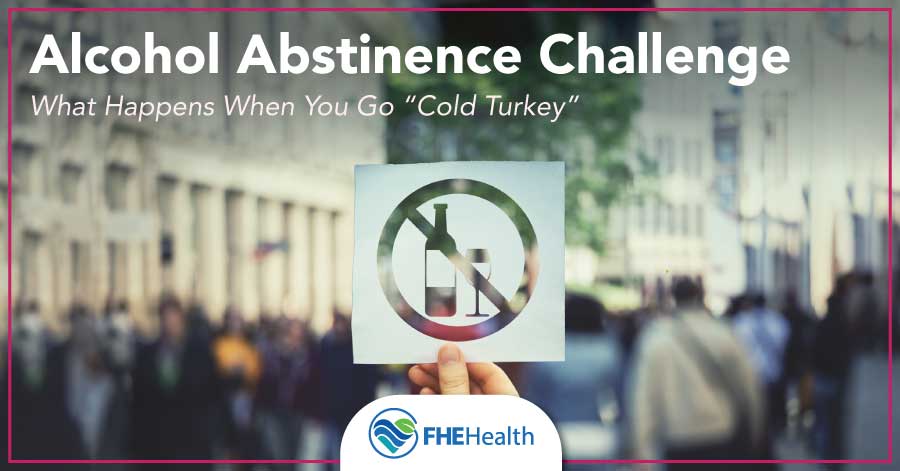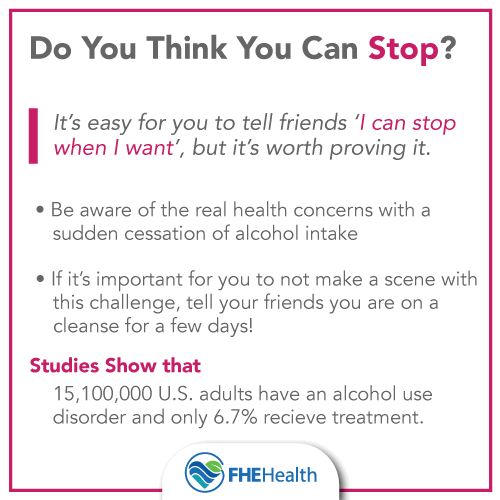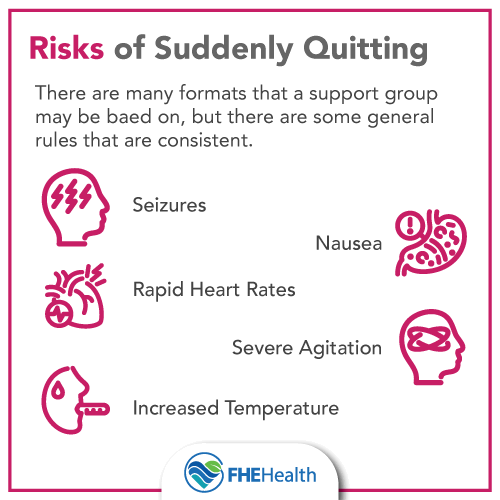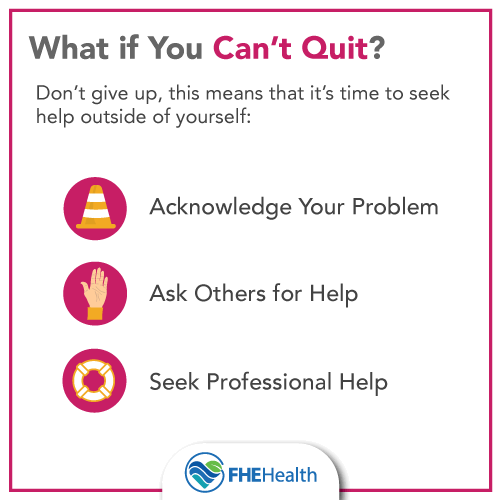
The Alcohol Abstinence Challenge seems to be a straightforward, honest way to test yourself. All you have to do is go one week without drinking alcohol of any type.
It seems easy enough, but what this challenge proves is that abstaining from alcohol is not possible for an alcoholic. Doing so can even be dangerous unless it’s done under proper medical supervision.
Consider the Alcohol Abstinence Challenge for Yourself
 Do you think you can stop drinking alcohol on your own? Many people think they don’t have an alcohol addiction because they can stop drinking whenever they want.
Do you think you can stop drinking alcohol on your own? Many people think they don’t have an alcohol addiction because they can stop drinking whenever they want.
According to the National Institute on Alcohol Abuse and Alcoholism, 15.1 million U.S. adults have an alcohol use disorder, and just 6.7 percent of them receive treatment. It’s clear that many people believe they don’t have a problem.
The abstinence challenge aims to clarify whether you or someone else is an alcoholic. By quitting alcohol for a week, you prove you have control over your use.
Why This Is a Test of Alcoholism
What happens when you stop drinking alcohol for a week? This challenge doesn’t seem hard to do. But if you have a dependency, not consuming alcohol for even a week can significantly change your body and create intense alcohol withdrawal symptoms.
Alcohol withdrawal symptoms include both the emotional pull of the need to drink as well as physical symptoms. According to the U.S. Library of Medicine, symptoms include:
- Fatigue
- Anxiety
- Mood swings
- Nightmares
- Irritability
- Inability to think clearly
- Shakiness
- Sweating
- Nausea and vomiting
- Headaches
In severe forms, withdrawal may also cause a fever, agitation, severe confusion, hallucinations and seizures. If you abstain from drinking any kind of alcohol for a week and don’t experience symptoms, you may not have an addiction.
Know the Dangers of Quitting Alcohol if You Are an Alcoholic
 It’s very important for you to understand that abruptly not drinking alcohol after consuming large amounts of it over a long period of time can be life-threatening. Your body is chemically dependent on the alcohol.
It’s very important for you to understand that abruptly not drinking alcohol after consuming large amounts of it over a long period of time can be life-threatening. Your body is chemically dependent on the alcohol.
Your brain chemistry is altered. Seizures, rapid heart rates and severe agitation can occur. Some people may even lose consciousness.
Why does withdrawal occur? Alcohol works as a depressant within the body. As such, it slows down how the central nervous system functions. When you use it on a regular basis, even if it is just a few glasses of wine or a beer or two daily, your body becomes conditioned to the amount and presence of alcohol you consume. It adapts to that amount.
When you stop taking in that amount, the central nervous system reacts. It has to adjust to the lack of alcohol in the body, causing it to become overactive and even hyperactive. The body enters the hyper-sympathetic state. This means it is reacting violently to the change. Your heart rate speeds up. Your body raises its core temperature. You sweat, feel ill and may even feel faint.
This type of severe reaction is not common for most people. Many people can cut down on alcohol use without going through this level of withdrawal. Yet, it is a real risk for a chronic alcoholic. If you have a long-established pattern of consuming alcohol, don’t stop drinking like this. Work with your doctors and medical team instead.
Why It’s Important to Recognize You Cannot Control Your Alcoholism
Here’s what’s important to know. It’s not in your control to simply stop. You can’t control it.
The central nervous system operating your body right now is dependent on alcohol. As a result, when you stop using, your body stops functioning normally, and your brain tells you to drink.
When you recognize that you can’t control your alcoholism, you realize that addiction is a part of your life. If you don’t know if you are facing alcoholism, just try to stop for a week.
Recognize the control alcohol has over you. Then, realize you need some help to stop.
What If You Can Quit Drinking?
For some, going a week without alcohol is possible. Some people even manage to do it frequently.
If that’s the case for you, congratulations. At this point, your drinking may still be unhealthy, especially if you felt you needed this test.
Perhaps other people were concerned about you due to your drinking or behavior. It’s important to recognize that need. If you’re just saying “you could” stop, you’re missing the point.
What If You Can’t Quit?
 If you’ve tried and failed, don’t give up. It means that it’s time to seek help for your condition to give yourself the best possible chance at ridding your life of alcohol abuse. Don’t think of this as the worst outcome.
If you’ve tried and failed, don’t give up. It means that it’s time to seek help for your condition to give yourself the best possible chance at ridding your life of alcohol abuse. Don’t think of this as the worst outcome.
Sobriety doesn’t have to be a bland life without fun if that’s what you imagine it to be. It’s an opportunity for you to recapture what alcohol is taking away from you right now.
- Are you spending more time with a bottle than with your family?
- Are you feeling ill or weak more frequently?
- Perhaps you’ve had a few DUIs or had trouble at work due to your drinking.
- Maybe your family has laid down an ultimatum.
No matter what you’re up against, battling alcoholism now is valuable. It may even help you avoid an early grave by taking this step toward improving your health.
Take the challenge. If you don’t make it through, realize there’s incredible help available to give you the ability to live a better life in sobriety.
Find the Alcohol Addiction Help You Need at FHE Health
We have compassionate, understanding professional counselors available to you at FHE Health. You can make the first step by giving us a call.
Allow our team to help you determine if detox or inpatient care may be right for your needs or if outpatient therapy is better for you. Speak to our alcohol admissions counselors by calling us at (833) 596-3502.






